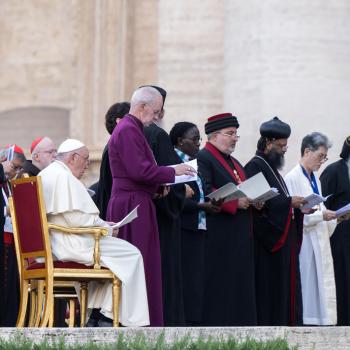
Nicholas of Cusa reminds us of the vast difference between the absolute truth and the truth which we can apprehend. This distinction allows us to recognize what we apprehend as being true even if it is not the absolute truth. We should not confuse the two. The fullness of truth is infinitely transcendent to us, making it incomprehensible as it is in itself to us; but its presentation towards us provides us something to apprehend and so allows us to have some element of the truth. That is, though the absolute truth is beyond us, we come awareness of the truth through our apprehension of the way the absolute truth relates to us: “Hence, regarding truth, it is evident that we do not know anything other than the following: viz., that we know truth not to be precisely comprehensible as it is.” [1] This suggests that a way of engaging and apprehending truth is through an awareness of and acceptance of our ignorance, of its incomprehensibility. “Since the unqualifiedly and absolutely Maximum (than which there cannot be a greater) is greater than we can comprehend (because it is Infinite Truth), we attain unto it in no other way than incomprehensibly.” [2] The reality of the truth is that it is apprehensible, even if it is incomprehensible; this is why we can ascertain, from our apprehension, that what is false, is false, because our apprehension of the truth allows us to recognize falsehoods as being disconnected from the truth. Or, it can be said, we can know something to be true without comprehending the absolute truth, and we do this by apprehending the truth:
Wherefore, we say that a sound, free intellect knows to be true that which is apprehended by its affectionate embrace. (The intellect insatiably desires to attain unto the true through scrutinizing all things by means of its innate faculty of inference.) Now, that from which no sound mind can withhold assent is, we have no doubt, most true.[3]
While God, the source and foundation of every truth (and who can be said to be the absolute truth itself), transcends us, and so is incomprehensible to us, God provides everyone and everything what they need in order to have an apprehension of the truth (and so we can have an apprehension of God). The truth can be known, even if it is not comprehended by us; the truth can be named by what is revealed to us through our apprehensions of it, even if the truth transcends those apprehensions. Thus, even if God rightfully transcends every name in accordance to the incomprehensibility of the divine nature, we can and will apply names to God through what we apprehend of God (God’s uncreated energies). We might even understand what we apprehend, for it is the truth in a form which is relatable to us, but we must always remember, our apprehension is limited, and is infinitely exceeded by what lies beyond our apprehensions. This is why Nicholas said that God, the Maximum, is “both incomprehensibly understandable and unnameably nameable.” [4] It is this incomprehensibility which has God as fundamentally “unknowable” and yet it is also our apprehension of God which paradoxically allows us to know that God is incomprehensible and unknowable:
Thus, in spite of its unknowableness, the unknowable must somehow be encountered by us in the content of our experience (taking “experience” in the broad sense as the totality of everything that in some form is “given” to us, is “present” before us, or is “revealed” to us). If our experience did not contain what we me mean by the unknowable, it is evident that we would not form such a concept or even use the word “unknowable.” [5]
We have, therefore, a great paradox, and yet it is the paradox which is at the heart of metaphysics, one which requires us to accept our limitations and yet use those limitations to gain a greater understanding of what lies beyond our comprehension. God is always at work, giving us what we need for our apprehension, and God is doing so in a variety of ways, from the way God can and is encountered in and through all things (as all things point to God in their nature) to the special revelation which God can grant us, revelation which directs and guides us to apprehend insights which our reason alone could never attain. But at the core of all such apprehensions is the realization that our apprehension only gives a semblance of the truth:
And this we ought to know: that revelation and the working [thereof] are one thing, and truth and knowledge another, in that revelation is not the exactness of truth itself, but shows certain indications and sings in proportion to human capacity; nor are the workings and wonders of revelations said to be truth and knowledge; they are called the overshadowing of the [divine] working. For there is no way to learn from them anything about the foreknowledge of God, or the incomprehensibility of His nature, or the distinctions in His properties, or insights into the mysteries of His will for mankind, or the other things that are to be obtained by sound knowledge of Him. Therefore the mysteries that the understanding apprehends through insight int the divine nature are one thing, and the [divine] working that overshadows the mind for a time is another.[6]
The best way to engage and apprehend the truth is by allowing the truth to reveal itself to us; to silence our thoughts, our words, our ideas, so as not to place ideological constructions over our apprehensions, constructions which would only get in the way of our apprehension, that is, get in the way of our apprehension of the truth and its fullness. So long as we think we can capture the truth in our words instead of merely pointing to the truth beyond words, we will misconstrue our thoughts and create falsifications of the truth as we absolutize what should not be seen as absolute. We must allow the absolute itself to be absolute; all our words should be understood as truth only in a relativized sense, a sense which then needs to allow itself to die out so that the truth represented through it can be better apprehended. Or, as S.L. Frank said it:
We cannot speak of ultimate truth and express it in our concepts, but this is only because the ultimate truth itself speaks, wordlessly, for itself and of itself, expresses and reveals itself. And we have neither the right nor the possibility to full express through our thinking this self-revelation of ultimate truth. We must be silent before the magnificence of truth itself.[7]
Thus, the way of apophaticism, the way of denial, the way of silence, must not be confused with nihilism and the denial of the truth itself. Proper apophaticism allows for apprehensions of the truth, and even expressions of what is understood through such an apprehension. Its role is to remind us that what we state is not the truth in itself, but an approximation of the truth which is far less than the truth itself. Our propositions can be used to represent the truth so long as we use them to direct us to what the truth reveals of itself to us; they lead astray, and to believe in some sort of falsehood, when we make too much out of our statements, because then we try to capture and limit the truth in accordance to our comprehension. “Hence the infinite, qua infinite, is unknown; for it escapes all comparative relation.”[8] What we lose when we do this is far more than what we gain, for there will be no comparison between the relative, limited truth we have and the infinite incomprehensible truth which we leave behind. Thus, while we are not denied reflections on the truth based upon our apprehensions of it, indeed, they are expected of us, we must always recognize the limits of those apprehensions and not confuse them, thinking that through them, we have comprehended the truth.
[1] Nicholas of Cusa, On Learned Ignorance. Trans. Jasper Hopkins (Minneapolis: Arthur J. Banning Press, 1985; second ed, 1990), 52.
[2] Nicholas of Cusa, On Learned Ignorance, 53.
[3] Nicholas of Cusa, On Learned Ignorance, 50.
[4] Nicholas of Cusa, On Learned Ignorance, 54.
[5] S. L. Frank, The Unknowable: An Ontological Introduction To The Philosophy of Religion. Trans. Boris Jakim (Brooklyn, NY: Angelico Press, 2020), xx.
[6] Saint Isaac the Syrian, The Ascetical Homilies of Saint Isaac the Syrian. Trans. Monks of the Holy Transfiguration Monastery. Rev. 2nd ed (Boston, MA: Holy Transfiguration Monastery, 2011), 544 [Appendix A Homily V].
[7] S. L. Frank, The Unknowable: An Ontological Introduction To The Philosophy of Religion, 96.
[8] Nicholas of Cusa, On Learned Ignorance, 50.
Stay in touch! Like A Little Bit of Nothing on Facebook.
If you liked what you read, please consider sharing it with your friends and family!











